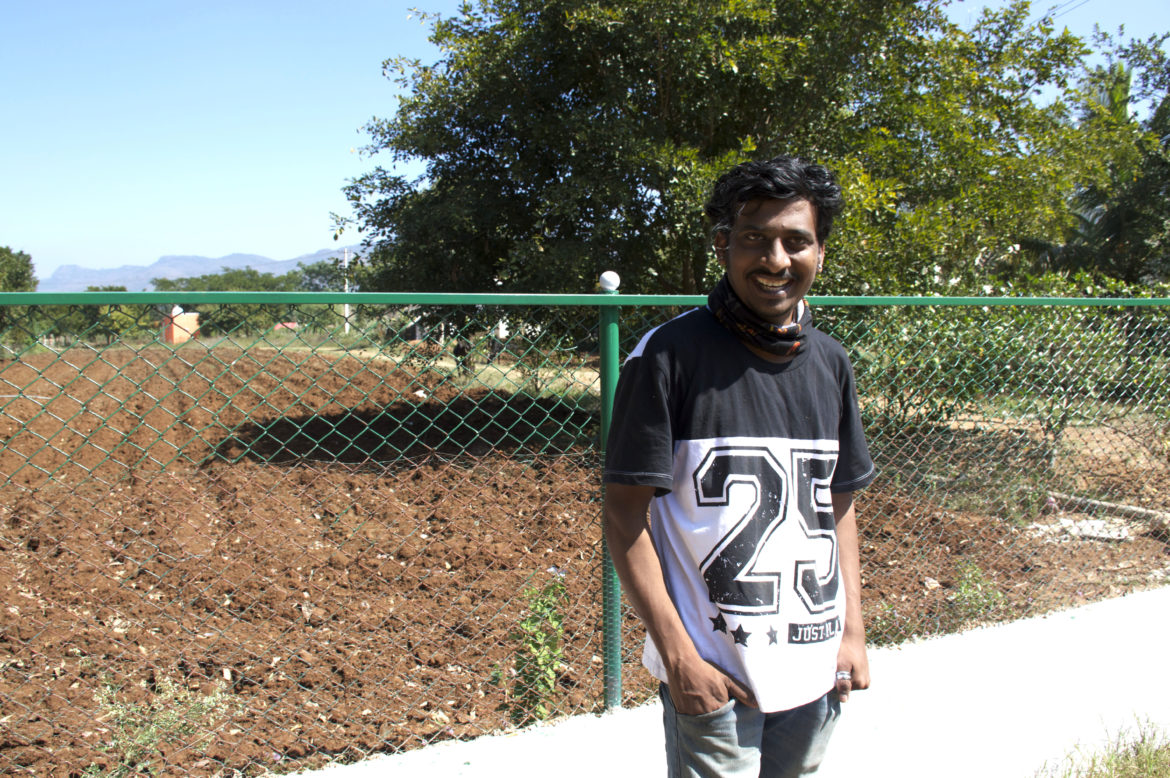Sugarcane farmer Praveen Mro, who attended a gender seminar at Amrita Bhoomi, feels committed to learning skills for the betterment of his family’s farming community. Praveen took interest in the course’s objectives of using sustainable agriculture as a means to remodel production, and to alter expectations set on each gender. “I realized that we place so many conditions on women, especially the female farmers,” Praveen said. “It is common to find agrarian societies and families that live in spite of their female children. This is because of the strong division of labor that keeps women from being able to participate in certain tasks.” Photo by Sophie Fernandes.
The ODYSSEY Media Group will provide viewers with stylized profiles that center on people in the Athens community telling their own stories.
By SOPHIE FERNANDES – Print Managing Editor
A three-day gender seminar at a sustainable farm community in Karnataka, India teaches emerging farmers more progressive views on gender. Participants left with an enlightened perspective to bring home to their communities.
Sugarcane farmer Praveen was a student in a three-day gender seminar which took place at Amrita Bhoomi (Eternal Earth), a sustainable farm community in Karnataka, India. Participants took courses in marketing, farming techniques and gender roles. While each class was required, Praveen found the gender session especially interesting.
“I was aware of all these things we spoke about, especially the unequal treatment of women and other genders in society, but the main thing I realized from this course was that all this while I wasn’t doing anything about it,” Praveen said. “I now have the clarity that I myself can and must make changes, starting from my own home.”
Each day of the gender course has its own specific focus.
Day One: The social stigma and image of the farmer, expectations and viability in agrarian society and dealing with expectations of being a man.
“We questioned masculinity and what pressures men face. You have to start thinking about what they are experiencing — how to cope with failure, all the financial responsibilities fall on them, all the parental responsibility falls on them,” instructor Nitya Mysore said.
Mysore also talks to students on a personal level about the misconceptions placed on farmers in their caste system society, a traditional division of labor amongst Indian citizens based on religious roots, skin color, etc. The caste system not only dictates a person’s occupation, but what social interactions he may have as well.
According to Mysore, several of the students at the school pursue farming without their parents’ approval because since 1500 B.C. members of higher caste have looked down on farmers for being a part of the lowest caste (the Sudras).
As someone who has experienced oppression for being gay throughout her life, Mysore felt drawn to Amrita Bhoomi because of its support LGBTQ community, such as efforts to act as a refugee center for LGBTQ peoples who, according to Mysore, are generally ostracized elsewhere.
Mysore knows how dangerous and difficult identifying as LGBTQ outside of places like Amrita Bhoomi can be. So, as a means to create a welcoming environment for LGBTQ students to feel comfortable, Mysore mentions her personal experience. She has seen several students share the same reaction to her lesson on masculinity and expectations, both at Amrita Bhoomi and in Mysore’s years of experience teaching the course.
“In one course, we had a gay student come out strong and proud. At the end of the workshop, he came up to me and asked, ‘Does this mean I have to be like a woman?’ That’s a prime example of the stigma gay men have to face,” Mysore said.
Day Two: Institutionalized discrimination, division of labor between genders, caste, marriage and economics.
After questioning conventional ideals, Mysore feels students must shift gender role misconceptions in order to see a sustainable agricultural shift. Mysore also addresses how in a community where women rarely have a say, are expected to be submissive housewife and carry out specific duties, change is necessary.
“We cannot continue to follow misogynistic traditions. It is 2017. Things are not the same anymore, therefore the roles we give women in society should not and cannot be the same,” Mysore said. “I feel like in order for this to happen, both women and men have to be willing to adapt to the change.”
Day Three: Sexuality, sexual health and sexual rights.
Unlike in Georgia, where students are taught about sexual health in the eighth grade, Mysore says most Indian citizens go their entire lives without a sex ed course.
“There is this huge lack of sex education and this is because of cultural reasons. There is no ‘abstinence-only,’ or anything like that. No one wants to talks about sex because they think it gives children the idea that sex is ‘okay,’” Mysore said.
